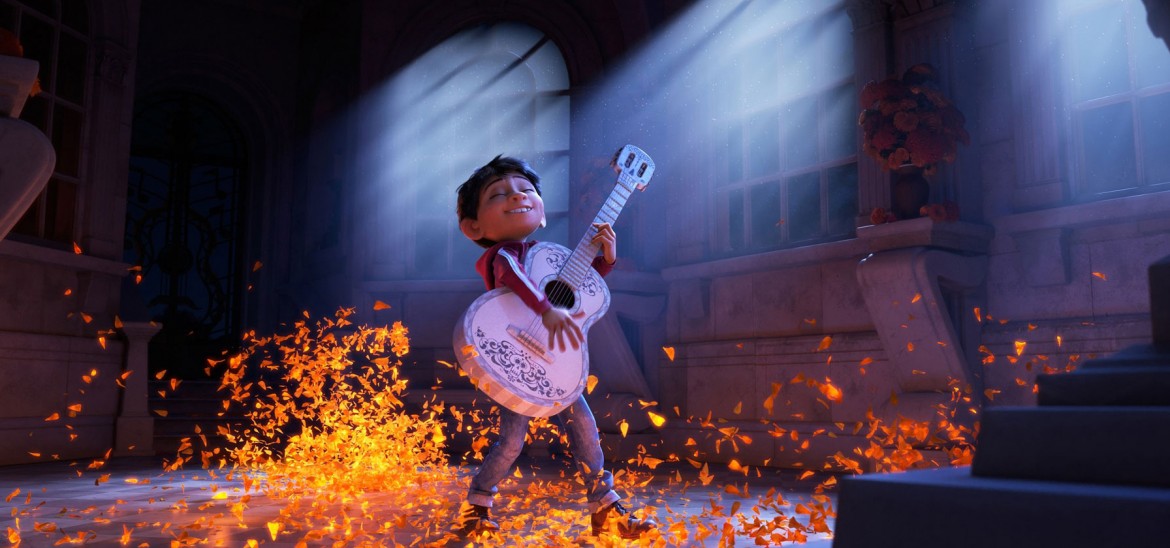Into Film Clubs
Find out everything you need to know about starting an Into Film Club.



Coco, Pixar's 19th feature film is an original animation which tells a cultural story about Diá de Muertos: the Day of the Dead. Celebrated from 31 October to 2 November by Mexicans around the world, the holiday usually sees families and friends gathering to pray for and honour those that have passed. Traditions include building altars or shines in memoriam and eating the favourite food and drink of those being remembered, with colourful flowers and skulls often part of the carnival.
Coco sees a 12-year-old Mexican boy named Miguel Rivera defy his family, who have imposed a longstanding ban on music. This is due to Miguel's great-great-grandmother being left to raise her daughter Coco alone after her husband decided to travel the world to pursue a career as a singer. Desperate to play nonetheless, Miguel attempts to "borrow" the guitar of his hero, Ernesto de la Cruz, an action which sees him magically transported to the spectacular Land of the Dead. Though he is initially glad to meet past generations of his family there, they hold the same rigorous disdain of music. Faced with being trapped in the afterlife forever, Miguel teams up with a trickster called Hector to escape, as the two embark on a wild adventure full of twists and turns, as Miguel learns some unexpected details about his family history along the way.
In recent years, Pixar and parent company Disney have been telling more culturally diverse stories from around the world, from Queen of Katwe to Moana, with Coco very much following that trend. Pixar have always been keen to ensure their pictures are as authentic as possible, and their desire to get the details right is reflected in the fact that this film was in production for seven years - the longest of any Pixar title to date. The voice cast is exclusively Latino and the film was co-directed by Adrian Molina, a Pixar animator of Mexican descent who worked in various roles on previous Pixar films, including Ratatouille, Toy Story 3 and Monsters University.
Additionally the crew visited Mexico on several occasions to conduct research into the food, traditions, people and culture. Spanish words and phrases appear regularly throughout the story, un-subtitled, giving it a natural feeling without confusing the audience. It's a way of reminding us of how much the English language is influenced by others. Even the iconic ‘When You Wish Upon a Star' jingle - which opens Disney-associated animations - is reworked here and given a Latin American flavour.
Though it is not even the only animation in recent times to focus on the Day of the Dead - The Book of Life explored the subject to equally impressive effect - Coco has quickly become the biggest film of all time at the Mexican box office. The two films have plenty in common; their vibrant visual representations of the Land of the Dead, for instance. Coco's version of this mystical place bursts to life with blasts of colour, reminiscent of the studio's previous films, such as the landscape within Riley's head in Inside Out, the seemingly never-ending universe of doors in Monsters, Inc. and the searing optimism of the balloon-aided escape in Up. Nevertheless, each film has a unique perspective on the celebration; The Book of Life is centred more on friendship and romance, and is essentially an offbeat fairy-tale, whereas Coco acts as more of a traditional family adventure full of warmth and excitement.
It's no surprise that music plays a pivotal role in the film. Miguel is desperate to play; it's in his blood, and he feels that it's his destiny to become a celebrated musician. But equally important is the pull of family, and the expectations placed upon him. Similar conundrums saddle the protagonists of Rock Dog and Moana, who find that their own ideas about music in their future don't tally up with the hopes and expectations of their families. Despite this struggle, the story proves that there is room for both in life, celebrating the power of music as well as the importance of family through its narrative.
The film celebrates these two themes by placing significant value on memory and legacy. In Coco, as long as a character is remembered by somebody in the real world, they continue to exist in the Land of the Dead. But when nobody is left alive to honour their memory, they disappear from the Land of the Dead too and cease to exist forever. Miguel must return home before his great grandmother Coco forgets his ancestors. The film's central song, ‘Remember Me', is a one which Coco had sung to her as a child, and has since passed down from generation to generation. It joins memorable tunes from Pixar's canon such as Toy Story's ‘You've Got a Friend in Me' to Monsters, Inc.'s ‘If I Didn't Have You' that continue to move audiences. The song fittingly acts as a motif throughout and perfectly demonstrates the central themes of music, family and memory combining. As our young reporter Rashaan puts it in his review of the film: "Coco teaches about how important it is to not forget about your loved ones…"
Pixar's latest film is a colourful celebration of the macabre, which honours family, music and legacy, and which encourages us to seize the moment. Though it is an admirably culturally specific story, the appeal is universal, and Coco reminds us that Pixar have many more original tales to tell.
Explore the themes of Coco further with our Into Film Recommends podcast below, or log in to SoundCloud to download the podcast and listen on the go.
The Into Film Recommends Podcast Series is also available on iTunes.
Viewing 4 of 4 related items.

Get in touch with your article ideas for the News and Views section.